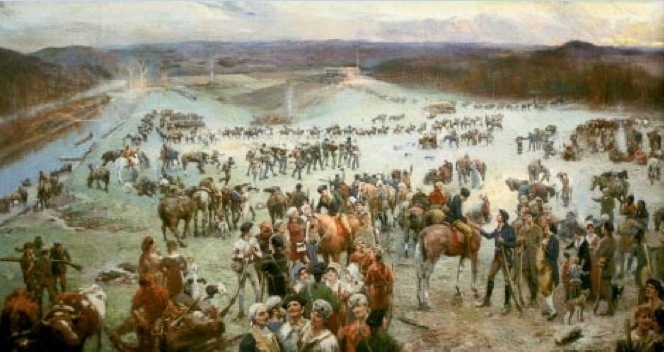RALEIGH
Sep 28, 2022
Patriot militiamen encamped in Polk County changed the course of the Revolutionary War and their actions will be recognized with a North Carolina Highway Historical Marker.
The marker recognizing the Overmountain Men will be dedicated at NC 108 at County Line Road, east of Mill Spring, on Oct. 5 at 3:30 p.m. It is near Alexander’s Ford on the Green River, a well-known crossing point. Speakers will include Tommy Melton, chair of the Polk County Board of Commissioners, Marche Pittman, County Manager, and William Caldwell, a ranger representing the Overmountain Victory National Historic Trail. The ceremony also will feature local reenactors and community members who sought the marker. Additional information about the marker can be found at http://www.ncmarkers.com/Markers.aspx?MarkerId=O-84.
The Overmountain Men were American frontiersmen from west of the Appalachian Mountains. The term “overmountain” arose because their settlements were west of, or “over,” the Appalachians, which was the primary geographical boundary dividing the 13 American colonies from the western frontier. The Overmountain Men hailed from parts of Virginia, North Carolina, and what is now Tennessee and Kentucky.
Two days before the Oct. 7, 1780, Battle of King’s Mountain, about 1,400 of the Overmountain Men, camped at Alexander’s Ford, were preparing to meet the British and Tory forces in Ninety-Six, South Carolina. But with the arrival of new intelligence describing the whereabouts of another British force led by Major Patrick Ferguson, they changed their course and headed toward the Charlotte area. The decision provided Patriot forces with some of the best riflemen during the Battle of King’s Mountain, which was a turning point of the campaign. From then on, revolutionary forces controlled the Southern theater of war.
This surprising victory of the American Patriot militia over the Loyalists followed a string of Patriot defeats at the hands of Lord Cornwallis, and greatly raised the Patriots’ morale. With Ferguson’s death in the battle and his Loyalist militia destroyed, Cornwallis canceled his plan to invade North Carolina and retreated into South Carolina.
The National Park Service highlighted Alexander’s Ford as one of the key points along the Overmountain Victory Trail.
For more information, please visit https://www.ncdcr.gov/about/history/division-historical-resources/nc-highway-historical-marker-program or contact Ansley Wegner at ansley.wegner@ncdcr.gov.
About the North Carolina Department of Natural and Cultural Resources
The N.C. Department of Natural and Cultural Resources (NCDNCR) is the state agency with a vision to be the leader in using the state’s natural and cultural resources to build the social, cultural, educational and economic future of North Carolina. NCDNCR’s mission is to improve the quality of life in our state by creating opportunities to experience excellence in the arts, history, libraries and nature in North Carolina by stimulating learning, inspiring creativity, preserving the state’s history, conserving the state’s natural heritage, encouraging recreation and cultural tourism, and promoting economic development.
NCDNCR includes 27 historic sites, seven history museums, two art museums, three science museums, three aquariums and Jennette’s Pier, 41 state parks and recreation areas, the N.C. Zoo, the N.C. Symphony Orchestra, the State Library, the State Archives, the N.C. Arts Council, the African American Heritage Commission, State Preservation Office and the Office of State Archaeology, and the Division of Land and Water Stewardship. For more information, please visit www.ncdcr.gov.



